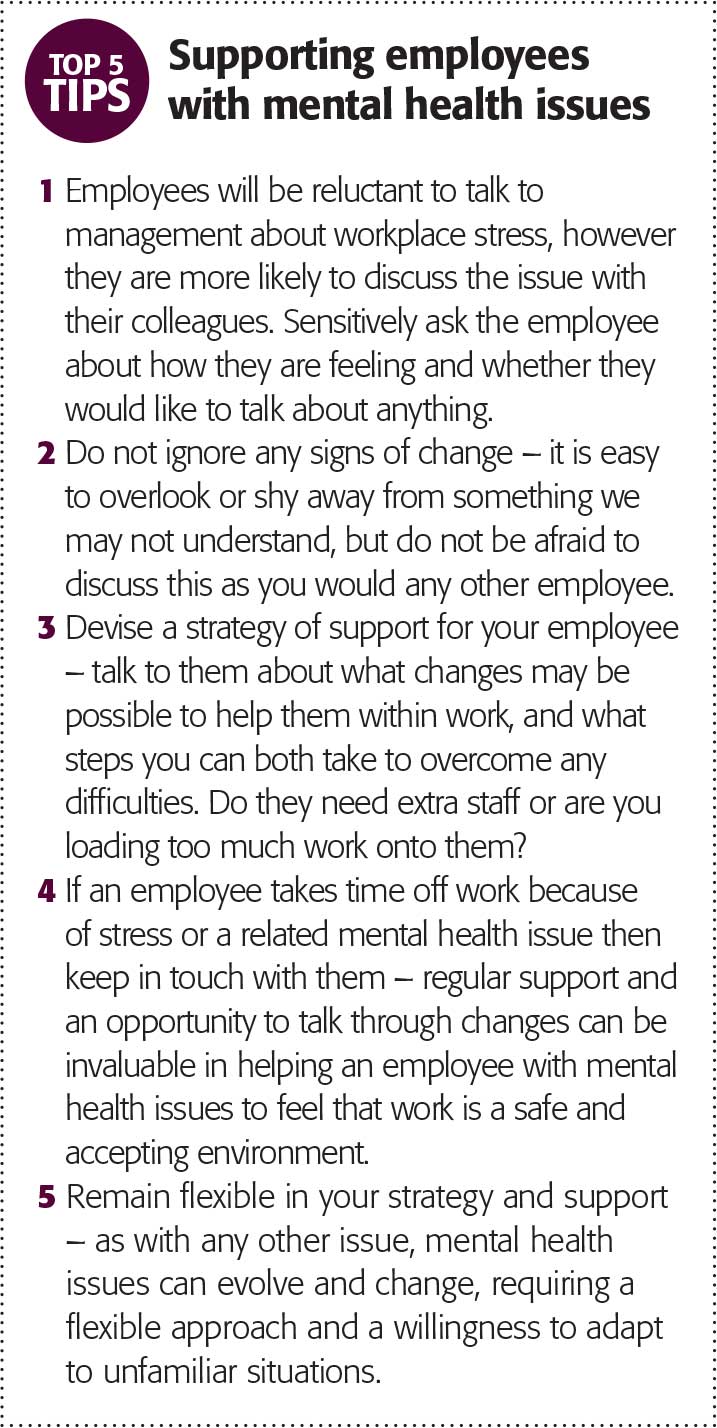
Tackling mental health issues

Employers should not ignore the signs of mental health problems, David Price explains
Up to 50% of absence rates at work are due to mental health issues and workplace stress. When left untreated, the cost to the British economy is up £12bn annually. Despite being such a prevalent issue, spotting indicators of workplace stress among your colleagues can be difficult.
In the broking world there are a number of specific stress triggers; I increasingly observe anxiety and excess working. Stress is carried over when workers go on holiday. There seems to be a sense of fear among brokers in relation to not having a job when they return to work, which has been triggered by a recent number of broker consolidations.
Brokers are concerned about the future, working harder to justify themselves, and putting in extra hours to make themselves stand out. Longer hours mean an increase in stress and less time with family. As long as uncertainty within the broker industry continues then there will be increased stress levels.
Shame can keep these feelings and issues hidden out of sight, while a lack of understanding by others can leave someone suffering in silence.
 Stress factor
Stress factor
Workplace stress can be a contributing factor when it comes to mental health. There are many common symptoms which can impact on work, but this may not be immediately apparent. For example, social withdrawal, general apathy and a lack of interest in others may significantly impact on wider life, but not their work.
Change in an employee’s mood, social behaviour and performance can be a significant indicator of someone’s mental health deteriorating and, as such, it is important as an employer that you are alert to such changes.
Stress can occur in or out of the workplace; nonetheless it is important to address the situation in either instance to ensure it does not escalate into a mental health issue. Receiving appropriate support can make a huge difference to an individual.
Duty of care
Employees should not be made to feel that their employment will be in jeopardy simply for talking about their personal workload burden. You have a duty of care to listen and act upon any concerns raised.
However what if stress has escalated into a serious problem and employees show signs of mental illness? It is helpful to encourage and assist the person to access professional mental health help.
If it is proved that stress is the cause of the issue then review their workload, identify what the problem is and rectify it. Encouraging an open door policy, regular breaks and social interaction between employees can create a more relaxed environment within your workplace, reducing stress levels and decreasing the chance of an employee feeling isolated or under pressure.
Your employees are paid to perform a job within the remits of their capacity; however stress can easily escalate and have a detrimental effect on their health and performance.
If you had a colleague who had hurt themselves physically you would not hesitate to ask how they were. But when it comes to mental health issues there is often an associated stigma which can leave us uncertain of what to say; in reality, this is often a simple task.
Take the lead and do not be afraid to ask how your employees are. Even if they do not want to talk about stress related issues, letting them know they have the choice can be helpful. Giving them the time and space to talk is important, but this doesn’t have to focus on mental health. It is important to ensure they are not overburdened by work, so regular communication is essential.
It is also important to note that your employee will have developed their own coping strategies to manage their mental health issues. Nevertheless, as an employer you should strongly advise your employee to seek out the help and guidance that your organisation may offer.
David Price is managing director of Health Assured
Only users who have a paid subscription or are part of a corporate subscription are able to print or copy content.
To access these options, along with all other subscription benefits, please contact info@insuranceage.co.uk or view our subscription options here: https://subscriptions.insuranceage.co.uk/subscribe
You are currently unable to print this content. Please contact info@insuranceage.co.uk to find out more.
You are currently unable to copy this content. Please contact info@insuranceage.co.uk to find out more.
Copyright Infopro Digital Limited. All rights reserved.
As outlined in our terms and conditions, https://www.infopro-digital.com/terms-and-conditions/subscriptions/ (point 2.4), printing is limited to a single copy.
If you would like to purchase additional rights please email info@insuranceage.co.uk
Copyright Infopro Digital Limited. All rights reserved.
You may share this content using our article tools. As outlined in our terms and conditions, https://www.infopro-digital.com/terms-and-conditions/subscriptions/ (clause 2.4), an Authorised User may only make one copy of the materials for their own personal use. You must also comply with the restrictions in clause 2.5.
If you would like to purchase additional rights please email info@insuranceage.co.uk







